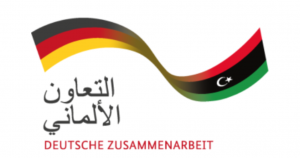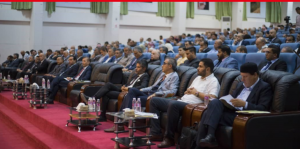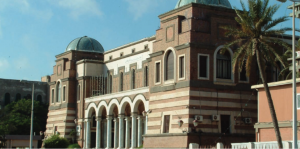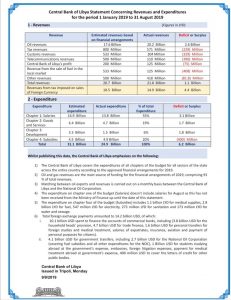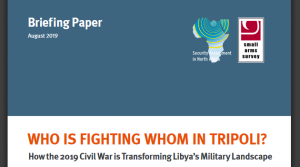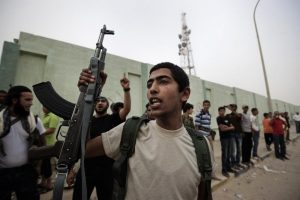
They witnessed the overthrow of Muammar Gaddafi, and have grown up in a society riven by war, no wonder then that the psychological toll on Libya’s youth has been critical
It is nearly half a year since Field Marshal Khalifa Haftar launched a grinding war for the Libyan capital of Tripoli. This battle, the latest in a series of brutal conflicts since the 2011 revolution toppled dictator Muammar Gaddafi, has taken an alarming psychological toll on the country’s youth.
For one anxious 20-year-old woman, panicked by the ongoing violence around her home in the conflict zone, the solution was to kill herself with a bottle of sedatives. “Her family refused to leave so she attempted suicide,” says frontline field clinic doctor, Mohamed Algeli. “We had to pump her stomach and send her directly to a hospital.”
For Libyans in their twenties, going to university, mulling careers, and socialising with friends can be a welcome reprieve before shouldering the conservative society’s expectations of nailing down a job, getting married and raising children.
But many in this generation, who as children experienced the bloody overthrow of the Gaddafi regime and the insecure chaos of militia rule that followed, share a deep-rooted anxiety about everyday life and the future.
Chronic gun violence, the corrupt enrichment of a few amidst growing societal impoverishment, inept government, broken services and displacement feed a widespread psychological need to block out reality.
The pull of militias
An estimated 120,000 civilians have been displaced by the Tripoli war today, while several thousand people – including civilians and many youth who chose to pick up guns and fight – are now dead and injured. Foreign aircraft bomb Mitiga airport and military targets in Tripoli’s southern suburbs on a daily basis.
‘I see so many good men but their minds are empty. We try to pull them from the streets and from the militias’
– Mahmoud Ahmed Danaf, University of Tripoli professor
At the University of Tripoli’s department of economics, US-educated professor Mahmoud Ahmed Danaf faces daily challenges from the conflict. Student attendance has plummeted to 20 percent he said, as some have taken to fighting on the frontline, been made homeless by war, are distracted, or fled the country.
He says housing on campus has been offered to displaced families, often leaving dedicated students to fend for themselves. Some pay for nearby hotel rooms so they can finish the end of year exams.
Student absenteeism is not the only challenge facing this university department. Professors receive a subsistence wage, which is often paid months late and the teacher’s union is weak. There are chronic power cuts and a lack of basic internet, online library access and projectors, while classrooms often lack furniture, blackboards and doors.
Then there are incidents like a student holding his professor at gunpoint to extract a better grade.
“What is destroying me is the students,” Danaf says. “I see so many good men but their minds are empty. We try to pull them from the streets and from the militias. But sometimes they get money and the power that opens doors.” He sighs deeply. “We are trying to persuade them to build their future instead.”
“Thank God we finished this semester,” exclaims Yousef Mabrouk Saheri, the 22- year old head of the student union at the department. He has spent the past months encouraging students to keep at their studies, even though he himself was made homeless by the war. Aspiring to be a banker, he echoes many others when he says he’d like to study and work abroad.
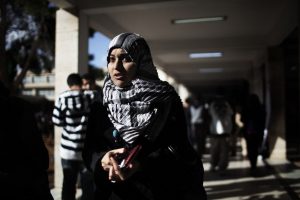
“Most people I know are not hopeful about the future,” says Emad Badi, a non-resident scholar at the Middle East Institute, told MEE. “Those that have long-term plans of staying in Libya are very few, unless they are not able to leave. The younger generation does not want to stay because of little to no future.”
The minister of education, Othman Mohamed, has ambitious plans. “After evaluating the education system, we realised we couldn’t improve or fix things, we needed total reform – starting with infrastructure, the curriculum and teachers.”
‘The younger generation does not want to stay because of little to no future’
– Emad Badi, Middle East Institute
But these goals are tempered for now by the war and his role as deputy of the Government of National Accord’s (GNA) crises committee, which manages the provision of electricity, water, health, and housing for the displaced. “It’s a nightmare,” Mohamed says. “We are like firefighters jumping from one crisis to another.”
And the crises could multiply even if Haftar is vanquished from Tripoli. Many Libyans predict his defeat could lead to another conflict between armed groups for spoils within the capital.
“It is clear that the anti-Haftar alliance will last as long as they face a common threat of Haftar’s forces at Tripoli’s gates,” Wolfram Lacher, a senior researcher at the German Institute for International and Security Affairs told MEE. “When the threat vanishes, the alliance will break apart.”
‘Mentally destroyed’
At a city café, a 25-year old former fighter in Tripoli said he gave up fighting five years ago, but is still in close contact with friends on the frontline.
“This young generation is mentally destroyed,” he says, describing how the militias have access to pharmacies, and fighters are addicted to a “mind erasing” cocktail of Tramadol for pain and Ecstasy for adrenaline. Cocaine is around, but expensive. Smoking hashish and drinking home-brewed alcohol has always been most common, he says.
He continues: “They don’t understand what family or street rules mean. They don’t care about respect. They take examples from the combat video games like PUBG – similar to Fortnite – where teams kill each other off, and then apply it to the real battlefield.”
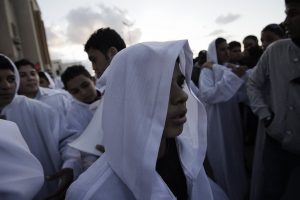
With the tightening of the Moroccan-Spanish border and the ongoing conflict in Libya, the drug business here has boomed.
The Special Deterrence Force (SDF), a powerful Salafi militia, runs a tightly secured rehabilitation centre based in the grounds of Mitiga airport, where they often detain without trial those considered drug pushers or addicts.
They are put through a recovery process, which includes training in trades like carpentry and religious workshops. Among Tripoli residents, this controversial programme in a location where abuse of inmates has been reported, is often praised but has proven difficult to assess.
‘A safe place’
As the conflict continues, the spread of psychological services has gained wider acceptance in a culture where mental illness is often stigmatised.
Dr Anwar Farjalla, a psychiatrist at the private clinic Psy Care, has been a practitioner since the 1980s, when the police would assign him criminal cases at the Al-Razi Psychiatric Hospital. “Many of the patients had tried to break into Gaddafi’s Bab Al-Aziziyah compound,” he recalls. “Some wanted to kill him, others thought he was a prophet, while many wanted to show him something.”
‘The militias will be here until judgement day. I wish the best for my country but that doesn’t make the bad not exist’
– Mohamed, 31, businessman
Now he treats mostly youth in their twenties – although the centre counts mothers and grandparents among their patients. “Chronic conflict, lack of jobs, money, services, homelessness, domestic violence – all of them can contribute to depression and insecurity.”
One of the in-patients from Zintan was treated successfully for generalised psychiatric disorder. The Psy Care staff said after he was discharged, he was kidnapped by criminals in the neighbourhood of Abu Salim and subjected to torture for ransom.
Dr Khawater Ghnemi, who works at the clinic with Dr Farjalla, said the man was sexually abused, burnt with cigarettes and starved. “When he was finally released, he returned to us because we were a safe place,” she said.
Mohamed, 31, is a level-headed businessman who, like his peers, wants to leave Libya and join his brother and sister, who work in Germany. He says he suffers from hypertension, like his younger sister, who died of a heart attack at age 21.
Mohamed speaks of a recent night when he and 15 friends held a party at a farm in Tripoli’s suburbs. A masked militia attacked them, forced them onto the ground as they performed mock executions, and robbed them of all their cell phones, computers, and car keys over the next 40 minutes.
“Then a miracle happened,” he recalls shakily. “A man arrived in a white land cruiser and sat next to us. He told us we were good guys, and that his men were not meant to treat us like this. He made the militia give every single thing back to us. I survived. This was an unbelievable twist.”
He raced home and shut himself in his room with acute anxiety. He has not talked about the attack to his friends or told his family and now feels he can no longer stay in Libya.
“Unfortunately Libya has reached a dead end,” he says. “The militias will be here until judgement day. I wish the best for my country but that doesn’t make the bad not exist.”
Germany aims to host Libya Conference
Germany aims to host a conference about Libya this year in conjunction with the United Nations to try to stabilise the oil producing country, where rival factions have been fighting over the capital, Germany’s ambassador to Libya said on Wednesday, Reuters reports.
The plans, which are still in the early stages according to diplomats, are the first major diplomatic push since eastern forces loyal to Khalifa Haftar launched in April an offensive to take the capital Tripoli, held by the internationally recognised government of Premier Fayez al-Serraj.
The campaign has displaced more than 120,000 people and derailed years of U.N peace efforts but gone nowhere as Haftar’s Libya National Army (LNA) has been unable to breach Tripoli’s southern suburbs.
U.N. Libya envoy Ghassan Salame last month unveiled plans for an international Libya conference to bring together foreign powers backing rival groups on the ground, without naming a venue.
“Germany therefore initiated a consultation process with key international partners. With sufficient preparatory work these efforts could lead towards a meaningful international event this fall,” Oliver Owcza, Germany’s ambassador to Libya, said on Twitter.
He gave no details on the event announced just after German Chancellor Angela Merkel told parliament the situation in the north African country risked destabilising the whole of Africa.
Diplomatic sources said the event would be held in Berlin in October or November.
Libya’s conflict has increasingly become a proxy war between foreign powers which have been backing various armed group since the 2011 uprising against Muammar Gaddafi – the former rebels have been fighting each other since then.
Haftar, who is allied to a parallel government in the east, has for years enjoyed the military support of Egypt and the United Arab Emirates, UN reports say.
Turkey has been backing Serraj and has been sending his forces combat drones and vehicles since the start of the war which has balanced out a military edge for the LNA, diplomats say.
Salame thinks Germany can mediate, as it is seen as impartial in the conflict in contrast to France and Italy, which have been competing for influence and have oil and gas interests in Libya, diplomats say.
Both countries brought Haftar and Serraj plus regional players together at summits in Paris and Palermo last year, but didn’t achieve a breakthrough.
Germany has strong ties with Turkey and Egypt, whose bilateral ties have been strained since the Egyptian military, then led by Abdel al-Fattah al-Sisi, ousted the Islamist President Mohamed Mursi in 2013 after mass protests against his rule.
The conference’s goal would be to push foreign players to enforce an existing arms embargo and for a ceasefire to allow Libyans to meet afterwards for political talks.
Key obstacles will be to get Turkey to sit with top officials from Egypt and the UAE, Western diplomats say.
The Turkish delegation withdrew at the last Libya conference held by Italy in November after Turkey Vice President Fuat Oktay was not allowed to join meetings between Haftar, Serraj, Sisi and European actors such as Italian Prime Minister Giuseppe Conte, according to diplomats.
LBBC to hold Conference in Tunis in November
The Libyan British Business Council (LBBC) has announced that it will be taking a business delegation to Tunis again this year – from Monday 18 to Thursday 21 November, 2019.
This follows on from last year’s very successful trade and investment mission, when it took over 60 representatives from 36 member companies to Tunis to meet more than 120 Libyan business counterparts.
National Oil Corporation (NOC) chairman Mustafa Sanalla and his top management team have confirmed their participation and will again be available for one-to-one meetings with delegates.
Faisel Gergab, chairman of the Libyan Post, Telecommunication and IT Holding Company (LPTIC) has also confirmed his attendance.
Additional state, parastatal and private sector bodies from relevant industries including energy, financial services and infrastructure, will also attend.
The business mission to Tunis will offer members the opportunity to develop their contacts and their knowledge of the political, security and economic environment, as well as current business opportunities in Libya.
The conference will address Libyan requirements in key sectors including oil and gas, financial services, infrastructure development, and education and training.
The mission is supported by the Tripoli Central Bank of Libya (CBL), Bank ABC and BACB.
Conference on Enterpreneurship and Microenterprises
On 21st – 22nd September 2019, a joint conference on private sector development took place in Misrata in the framework of the project “Support to Libya for Economic Integration, Diversification and Sustainable Employment” (SLEIDSE), co-financed by the European Union (EU) and the French Government and implemented by Expertise France.
The objective of this Misrata University – Chamber of Commerce Joint Conference is double. First it is to highlight to the Libyan civil society the importance of private sector development in the country for the economic future of Libya. Second it is to demonstrate the importance of supporting and recognizing young Libyan entrepreneurs and Libyan private sector executives within Libyan society if Libya is to achieve economic growth and play a role up to its potential in economic globalization.
The event was attended by GNA officials, heads of public administrations, representatives of banks, Misrata Municipality and representatives of the international community. Six Universities and Chambers of Commerce across the Libyan territory (Benghazi, Gharyan, Misrata, Sebha, Tripoli and Zintan) are involved in the SLEIDSE project, which aims to boost entrepreneurship in Libya. This objective was fulfilled by a series of activities:
- The design and the implementation of the first “University-Chamber of Commerce Joint Certificate in Entrepreneurship & Business Development”
- The creation of 6 Fab Labs within University Business Incubators
- The training of Fab Lab Managers
- The international Training of Libyan academics in teaching Entrepreneurship & Business Development
- The creation of opportunity for 90 selected young students across Libya to prototype their business idea, get trained and certified in Entrepreneurship and Business Development, and to promote their business to potential Libyan investors.
Three other projects are implemented by Expertise France in Libya:
- financed project that contributes to improving the business environment in Libya,
- STREAM, an incubator to support the development and strengthen the capacities of Libyan start-ups and young enterprises financed by the UK government,
- Microfinance (MFI), a project that establishes the first microfinance institution in Libya through a local bank financed by the UK government.
Outsiders’ Battle to Rebuild Libya Is Fueling the Civil War There
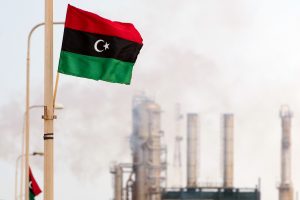
Four months after Libyan National Army (LNA) chieftain Khalifa Haftar began his assault on Tripoli, Libya is closer than ever to collapse. Haftar’s hopes for a swift seizure of the Libyan capital have unraveled due to stiff resistance from forces loyal to the United Nations-recognized Government of National Accord (GNA). Meanwhile, a panoply of international stakeholders—including China, Russia, Italy, France, and the Persian Gulf states—have become involved in the conflict, dragging it on. Although some of these actors cite the need to slow the flow of migrants from Libya to Europe or the hope of stabilizing Libya as rationales for foreign intervention, they’re also motivated by the prospect of lucrative reconstruction contracts.
The most bitterly contested contracts are in Libya’s oil industry, which is expected to double its production by 2023, and in infrastructure projects that leverage Libya’s strategic location on the Mediterranean Sea. For example, foreign powers are clamoring for dominance over the El Sharara and El Feel oil fields, which lie in southern Libya’s oil crescent; control of offshore oil deposits held by the GNA; and access to crucial ports, such as Benghazi and Ras Lanuf.
The balance of forces in Libya profoundly affects who will win what contracts. The United Arab Emirates, Saudi Arabia, Egypt, and France have supported the LNA’s military activities, and their economic interests hinge on the success of Haftar’s charge on Tripoli. Italy, Turkey, and Qatar have consistently supported the GNA and helped the U.N.-backed government resist Haftar’s territorial offensives. Russia and China have treaded cautiously in Libya and bet on neither party gaining a decisive advantage.
If the status quo, where the GNA controls Tripoli and its environs and the LNA dominates eastern and southern Libya, is formalized, Russia and China are poised to benefit the most.If the status quo, where the GNA controls Tripoli and its environs and the LNA dominates eastern and southern Libya, is formalized, Russia and China are poised to benefit the most. That is why they have advocated for maintaining this setup against other actors that would rather see the LNA or GNA emerge as the overwhelmingly dominant force.
And so, although Russia has been criticized for blocking a U.N. resolution condemning Haftar’s offensive on Tripoli and for allegedly deploying private military contractors in support of the LNA’s military activities, it has also maintained active relations with the GNA. This balancing strategy has economic foundations. Russia has printed dinars for distribution by Haftar’s parallel Libyan central bank, while the Russian energy giant Rosneft signed a deal to purchase oil from Libya’s National Oil Corporation in 2016.
Given these economic interests, the optimal scenario for Moscow is a peace settlement that ends the U.N.-enforced arms embargo against Libya and creates a frozen conflict. Prior to the overthrow of Libyan leader Muammar al-Qaddafi in 2011, Russia had $4 billion in arms contracts with Libya. Even today, the LNA’s air force relies extensively on Russian military technology, so Moscow would benefit greatly from the removal of the arms embargo.
Russia’s ability to balance favorable relations with the GNA and Haftar could also help Moscow land some much-coveted national infrastructure contracts. Russian companies are especially interested in constructing a railway linking Benghazi to Sirte, which would bolster Russia’s economic and geopolitical influence on the Mediterranean Sea, and Moscow hopes that its unique diplomatic strategy will help its bid for the $2.5 billion project triumph over rival offers.
As for China, which has adhered to a policy of stringent nonalignment in Libya, the preservation of the status quo could also help Beijing secure major reconstruction contracts. In recent years, China has taken steps to entrench itself as a major force in Libya’s oil industry and construction sector—both that controlled by the LNA and that controlled by the GNA.
After years of stagnation, Libya’s oil exports to China doubled in 2017, and National Oil Corporation Chairman Mustafa Sanallah has emphasized the importance of energy sector cooperation with Beijing. Libyan Prime Minister Fayez al-Sarraj has also pledged to expand the presence of Chinese companies in GNA-controlled territories, to guarantee Libya’s participation in China’s Belt and Road Initiative. North Africa is a small but rapidly growing area of interest for Chinese investors, and Beijing views a foothold in Libya as an essential component of its regional economic power projection strategy.
With Russia and China at a clear advantage, foreign powers that are unambiguously aligned with either the LNA or GNA are using military force to level the playing field.With Russia and China at a clear advantage, foreign powers that are unambiguously aligned with either the LNA or GNA are using military force to level the playing field. Although Haftar’s goal of seizing Tripoli appears far-fetched, the LNA’s sponsors, including Egypt and France, hope that he gains enough territory for international institutions to legitimize his control over eastern and southern Libya. Meanwhile, the GNA’s primary allies, including Turkey and Italy, are seeking to stymie Haftar’s offensive and restore control over southern Libya’s oil reserves to the internationally recognized government. The failure of either faction to gain a decisive advantage has stalled the resolution of the conflict and exacerbated the France-Italy, Egypt-Turkey, and intra-Gulf struggles for dominance in Libya.
Since Haftar seized control of Benghazi in 2017, France and Italy have been locked in a competition for influence over Libya’s petroleum reserves. Initially, Italy had the upper hand, as the Italian firm Eni had extensive access to oil reserves in southern Libya. Italy’s ambassador to Libya at the time, Giuseppe Perrone, struck a deal with the GNA to rebuild Tripoli International Airport’s passenger terminal. Haftar’s seizure of southern Libya’s oil fields nullified Italy’s advantageous position, and the French oil giant Total is now the largest prospective beneficiary from these reserves. Recent clashes in Murzuq are a flash point in the France-Italy rivalry, as both countries view the fate of that town as potentially critical to the future power balance in southern Libya.
Libyan Finances Ahead of Plan for Jan-Aug Period
Libya’s total revenues were 1.1 billion Libyan dinars ($800 million) ahead of budget for the first eight months of the year, according to a statement from the Central Bank of Libya (CBL) on Monday.
Oil revenues were 2.6 billion dinars ahead at 20.2 billion dinars, with all other revenue sources being below budget.
Meanwwhile, expenditure was 6.2 billion dinars below the planned level.
Central Bank of Libya Statement concerning Revenues and Expenditures for the period 1 January to 31 August 2019
Libya: the water war
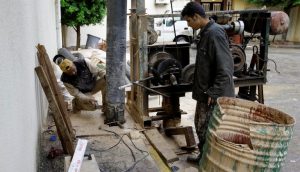
In the land of black gold, water no longer flows. Since the beginning of the summer, the Libyan capital has experienced no less than five major water cuts. The first one on May 20, at dawn. As the city wakes up, #WaterlessTripoli is gaining momentum on Twitter.
“How do I explain to my family that they have to go to the mosque to wash?” asked one angry social media user. These interruptions are in addition to frequent power outages. At the end of July, when the mercury hit over 35°C and most parts of the capital had to cope with just three hours of electricity a day, Tripoli’s taps ran empty for several days.
Political leverage
Admittedly, the front line is dozens of kilometres from the centre of the capital, which has been besieged by the Libyan National Army (LNA) of Khalifa Haftar since 4 April. But the resource war has invaded Tripolitan homes. In fact, the problem has been endemic since 2011, due to the inevitable degradation of infrastructure. “Foreign technicians no longer dare to set foot here for security reasons, and all modernization contracts – such as the project to build three desalination plants between Tripoli and Misrata – remain blocked despite the huge investment opportunities,” says Farraj al-Amari, former Director of Planning at Tripoli’s Ministry of Electricity and Water.
The collateral damage of the Libyan security situation is not solely to blame. National resources are also one of the central issues in the civil conflict. Their poor management crystallizes the tensions of a country, divided between clans and tribal groups, that has never made peace with its past.
“Since 2011, and especially during periods of war, water and electricity resources have been a political lever. Armed groups know this. And they exploit it for community or personal claims,” explains Lazib Mohamed Essaïd, a doctoral student at the French Institute of Geopolitics and an expert on Libya. In Tripolitania, controlling access to water and electricity is a powerful means of applying pressure against an increasingly inoperative government.
Collective punishment
In some cases, the cuts are similar to a collective sanction for the inhabitants. This is precisely what happened in May, when a pro-Gaddafi militia, now affiliated with Marshal Khalifa Haftar, voluntarily closed the Jabal al-Hasawna pumping station in the southwest of the country, blocking one of the networks serving the capital. The sabotage organized by Khalifa Hanaish, who heads the armed group, had a specific objective: to obtain the release of his brother, a military leader detained by a rival militia from Tripoli.
The capital, like other cities from the coast to Benghazi, is 95% dependent on water pumped in the south of the country, where the Nubian Basin is located, a water table shared by Libya, Egypt, Sudan and Chad. Discovered in 1953 during an oil exploration campaign, this underground basin was exploited by Muammar Gaddafi to carry water from the desert to the coast via the Great Man-Made River, the largest irrigation project in the world.
“Potential war crimes”
Since 2017, the LNA has made several attempts to advance southwest before turning north. In February, Khalifa Haftar finally managed to seize this strategic area, claiming its resources. “It is no coincidence that, in his progress, the Marshal followed the route of the main oil fields. The area corresponds to the area where the GMR [Great Man-Made River] extends,” notes analyst Djidel Hocine.
Consequently, the Government of National Understanding (GNA) of Fayez al-Sarraj, attributed deliberate water cuts to the Eastern Marshal, accusing him of causing a humanitarian crisis in the besieged enclave. “This summer, groups allied to Haftar in the southern part of the capital intentionally targeted water stations at least twice,” points Abdelkader Lahouili, a member of the Tripoli State High Council.
A United Nations press release has clearly described these as “attacks” and “potential war crimes” against civilians but stopped short of naming a perpetrator.
For their part, the LNA denies any involvement. Is Khalifa Haftar denying water to the population to win the battle? “He would have the means to do so, but the international community is watching him. Haftar still has a lot to lose in diplomatic matters. At the moment, he cannot afford to be likened to a war criminal,” says Jalel Harchaoui.
Political dividends for Haftar?
If the marshal is not directly involved in these sabotage operations, he seems to tolerate them when they are the work of local forces that support him. Any dysfunction in Tripoli works in his favour: a deterioration of the security situation, water and electricity cuts and poor infrastructure management. All of it fuels the frustration of a population deprived of essential goods.
As Abdelkader Lahouili confirms, “the situation has deteriorated with the war. The companies that manage the power plants around the capital are Turkish [Turkey supports the Tripoli government]. Technicians become a target, and the government can no longer access these areas. At the moment, the security issue remains a priority,”.
But in the long term, Haftar may well recover the political dividends of this situation. For Jalel Harchaoui, “the war is not progressing as the Eastern Marshal wished. If the GNA were to fall because the population rejects it, it would give [Haftar] a huge advantage”.
CALL FOR PROPOSAL

CALL FOR PROPOSAL
Build Civil Society Organization (CSOs) capacity in order to support youth’s and women’s economic empowerment and start-up entrepreneurship
This project funded by the European Union is implanted by Expertise France with a close cooperation of the Ministry of Planning. The Ministry of Planning is strongly involved in empowering the Civil Society Organizations to disseminate the entrepreneurship culture within their local communities in Libya.
1. ABOUT EXPERTISE FRANCE
Expertise France is the French public international cooperation agency. It designs and implements projects which aim to contribute to the balanced development of partner countries, in line with the Sustainable Development Goals of the 2030 Agenda and the priorities of France’s external action.
Expertise France’s mission is to meet the demand of partner countries seeking to enhance the quality of their public policies in order to address the environmental, social, economic and security challenges they are facing. The agency achieves this goal by implementing projects in those main fields.
2. PRESENTATION OF EXPERTISE FRANCE’S WORK IN LIBYA
Expertise France intervenes in Libya over 4 donor-funded projects since 2014, all related to private sector development and entrepreneurship empowerment:
SLEIDSE, an EU funded project, aimed at supporting economic diversification;
MFI, on UK aid funds, to support the implementation of a micro-finance institution, in close partnership with a Libyan bank;
STREAM aiming at setting up an incubator, accelerator and fab-lab programme in Tripoli;
The Private Sector Development Programme (EU4PSL), an initiative funded by the EU with the objectives of strengthening the capacities of Libyan public institutions, including Ministries of Finance, Economy and the Central Bank. It also encompasses a strategic work with Libyan CSOs to support entrepreneurship in remote places.
The overall portfolio amounts to 19 million euros, over 4 year. Additional developments are expected in the same field, especially a SLEIDSE 2, with a foreseen starting date early 2020.
4. EU4PSL PROJECT
The EU4PSL is an EU funded project, started as of Feb 2019, with an aim of improving Libya’s business environment in order to generate economic growth for private sector and job opportunities for youth and in particular for women. This project seeks to assist the government of Libya and all relevant stakeholders in their efforts to promote the development of an open, dynamic and diversified economy in Libya.
The project will contribute concrete and practical assistance to key Libyan stakeholders, who have capacity to accelerate the transition towards:
economic diversification;
improved competitiveness of Libyan private sector and;
increased role of young and female entrepreneurs in national wealth-creation.
The specific objectives (components) of the programme are:
Specific objective 1 (SO1): Strengthen the capacities of Libyan institutions to design and implement actions conducive to MSME development and improve the attractiveness of Libyan economy for investments.
This first component addresses the needed improvements, in terms of mandate, capacity and competence, of the fundamental institutional players in Libya in terms of the country’s economic strategy: MoE and MoF. An intensive set of activities will be implemented to help move the country out of its centralised rent-based economy and help increasing the role of the private sector. To achieve this, however, the MoE and MoF will be heavily involved as they have a considerable political influence.
The MoE and MoF roles in Libya are extremely broad, their mandate is complex, but their overall political influence is considerable. Consequently, the project focuses on three essential elements which constitute core competences of the MoE and MoF, chosen in relation to their potential and capacity to influence and drive change.
2.Specific Objective 2 (SO2): Support youth’s and women’s economic empowerment and start-up entrepreneurship.
The second component spans the entire “entrepreneurship chain”, from pre-entrepreneurship (increasing capacity of support services) all the way to “getting into active business” (facilitating access to funding for entrepreneurs). There exist several entrepreneurs of highly variable levels of advancement, competence and ambition throughout Libya. This component is designed to be able to simultaneously provide its assistance and expertise on an as-needed basis, rather than on a chronological or staggered basis.
3. Specific Objective 3 (SO3): Improve access to finance for MSMEs and start-ups, including with innovative financial tools and microfinance.
The access to finance component aims at facilitating the access to financial services to Libyan entrepreneurs either by improving the services of the existing financial institutions and/or by supporting the establishment of new bodies. The project will continue supporting the reactivation of the Libyan Credit Guarantee fund which was previously carried by SLEIDSE project along with developing new financial tools that had not previously existed within the Libyan market. In order to achieve the optimum results, the CBL, commercial banks, sovereign funds, etc. will be directly involved.
The overall objective of the action is to improve Libya’s business environment, in order to generate economic growth for private sector and job opportunities for youth and in particular for women.
4 – BUILDING THE CAPACITY OF THE LOCAL CIVIL SOCIETY (COMPONENT 2)
The aim of the component 2 is to organise and make operational a broad network of entrepreneurship-supporting organisations all over the country. This is expected to create a powerful network of actors and instruments that can be operational quickly.
Expertise France and the Ministry of Planning aim is to build and/or enhance capacities and visibility of CSOs dealing with youth and women empowerment.
The purpose of the present call for proposal is to identify Libyan CSO’s with thematic specialisation and capacity to support women and youth’s economic empowerment.
The component 2 of this project is divide in 2 outputs:
4.1 Output 1” Empowering women by mentoring”
Expertise France will organise a training to enhance the selected CSOs capacities.
The training will divide in 10 thematic workshops:
- Management and Human Ressources workshop
- Program development workshop
- Communication and Marketing workshop
- Partnerships and Fundraising workshop
- Reporting workshop
- Business modelling workshop
- Access to finance workshop
- Mentoring and coaching workshop
- Study tour
- Pitching skills workshop
- Afterward those CSOs will be in charge, for 5 months, to train and help concretely 2 females’ entrepreneurs to develop their business.
The mission will be, among others, to help women entrepreneurs to:
- formalize their business plan
- carry out the registration process
- teach them how to pitch their idea in front of potential investors
- develop their marketing and communication strategies
- formalize their accounting system
By being supported by CSOs, women-entrepreneurs will be able to rely on practical advice and collective help from their network. That will help them to successfully develop their business.
- The action will also provide financial support to be given to third parties.
Seed funds will be given through the selected CSOs to Libyan female entrepreneurs.
The objective is to help women to develop their business, make investments, increase their productivity and profitability. At the end the business must be developed, sustainable and make profit.
The different types of activities eligible for financial support are handcrafted activities, trading activities, food and catering activities, agriculture activities, IT activities.
The third parties will be co-selected by Expertise France and the selected CSO based on their business plan/ideas and on their capacities to develop it.
The criteria for determining the exact amount of financial support for each third entity will be the business plan proposed by the entrepreneur.
The maximum amount of financial support that can be paid must not exceed € 5 000 per third party.
4.2 Output 2 “Nation-wide Business contests”
In cooperation with Libyan universities, each CSO will implement and organize an entrepreneurship bootcamp (6 days of intensive training), to train 24 university students on business plans writing.
Then based on their business plan, entrepreneurs with best ideas will be trained on pitching skills to patriciate in a nation-wide business contest.
Both output 1 and output 2 will be annual activities for the next 3 years.
5.FUNDS AVAILABLE FOR THE ACTION
Given the crisis in Libya, the financing of the action in full is authorized.
5.1 For CSOs
The maximum amount to implement the activities will be € 60, 000 (split in 3, €20,000 for the first year and € 20 000 every year for 2 years) this budget should cover:
- mentoring and coaching 2 females’ entrepreneurs to create and develop their business for 5 months;
- organizing a 6 days Bootcamp (6 days of intensive training) in Libya for 20-22 young potential entrepreneurs;
- leading and organizing 6 workshops (1 every 2 months) the spread the entrepreneurship culture within the local community.
5.2 Support to third parties – female entrepreneurs (through the CSOs)
12 different women entrepreneurs who were able to initially start their business, will receive each year (over 3 years) € 5 000.
6. ELIGIBILITY
The selection process is subject to strict eligibility criteria
- Applicant eligibility
In order to be eligible for a grant, the applicant must:
- Be a Non-Governmental Organization
- Be a non-profit making entity
- Be registered in Libya
- Be directly responsible for the preparation and management of the proposal of the action, not acting as an intermediary
- Demonstrate the ability to manage activities related to the purpose of the project
If the applicant does not meet these eligibility criteria, the application will not be considered.
Please note that:
- a previous experience with international donors is an asset.
- a previous experience in supporting young and/or female entrepreneurs throughout the country is an asset.
- Actions eligibility
Duration
The duration of the action may not be less than 3 years. The action should start as soon as the contract with Expertise France is signed to respect the project schedule.
Themes
Proposed actions should be in line with the priorities identified in this call for proposals (please refer to paragraph4)
Geographical coverage
This project is designed to take place in the Libyan context so we will only select Libyan CSOs registered in Libya and with activities based in Libya. Expertise France team will take into consideration covering all 3 main regions in Libya (East, West, South). Once selected the CSO must implemented the action in the defined region.
Types of action
Proposed actions should fall within the areas identified in the present call for proposal (cf. paragraph 4). Actions must respond to identified needs and project objectives. They must be achievable given the time allocated, the geographical, economic and political context.
The following types of action are ineligible:
- actions concerned only or mainly with individual sponsorships for participation in workshops, seminars, conferences and congresses;
- actions concerned only or mainly with individual scholarships for studies or training courses;
- actions including aspects of religious and political proselytism.
Costs eligibility
Eligible cost are costs related to the implementation of the action. The eligible costs are mentioned in the budget template.
The grant allocated by Expertise France will cover the actual costs incurred by the beneficiary (supporting documents, receipts will be asked).
Ineligible costs:
– debts and the burden of debt (interest);
– provisions for potential future losses or debts;
– the costs declared by the beneficiary and financed by another action or program
– purchases of land or buildings,
– credits to third parties;
– the cost of the salaries of the staff of the national administration.
7. VISIBILITY
Applicants must take all necessary steps to publicize the fact that the European Union has financed the action and must comply with the objectives and priorities and ensure the visibility of EU funding.
Applicants must also take all necessary measures to ensure the visibility of Expertise France and the EU4PSL project.
8.ONLINE APPLICATION PROCEDURE
Number of applications and grants per applicant
The applicant:
- cannot submit more than one application under this call for proposals.
- cannot be awarded more than one grant under this call for proposals.
Incomplete applications will not be considered.
8.1 Questionnaire
In order to summit your application please answer the questions bellow (in English or Arabic) and upload the required documents. Your answers must be precise and as detail as possible.
8.2 “Skills and added value description”
In a separate document you will have to explain in minimum 4 pages and maximum 8 pages:
- How will you be able to support, mentor and coach female entrepreneurs every year for 5 months?
- How will you organize a 1-week intensive training with the local universities for their students?
- How will you organize the workshops?
- How will your CSO become a local business hub for local entrepreneurs?
- How will you disseminate the entrepreneurship culture within your community?
- How the sustainability of the action is ensured?
- How the action will be made sustainable once it has been completed: follow-up actions, internal strategies, ownership, communication plans
- What Is you added value in the implementation of this project?
It is very important that this document contains all the relevant information about the action.
Please upload this document (a PDF version) at the end of the application process.
8.3 Budget
Applicants will provide the amount of the requested contribution (60 000 euros max.) in the form of a detailed budget. Please use the given template (link), fill it out and upload it.
Your budget proposal must be realistic, detailed and justified.
Expertise France reserves the right to seek clarification in case on unclear budget. The award of a grant is subject to the condition that the checks preceding the signature of the grant contract do not reveal problems requiring budget changes (i.e arithmetical errors, inaccuracies, unrealistic costs and/or non-eligible costs).
This verification procedure may give rise to requests for clarification and may lead Expertise France to impose minor amendments.
9. REPORTING AND PAYMENT TERMS
- Reporting
Every 3 months, the successful applicant will be required to provide a narrative and financial report.
The selected CSO will have to provide Expertise France with all required information on the implementation of the action. The report shall describe the implementation of the action according to the activities envisaged, difficulties encountered, and measures taken to overcome problems, eventual changes introduced, as well as the degree of achievement of its results (impact, outcomes or outputs). The report shall be laid out in such a way as to allow monitoring of the objectives.
A financial report with all original documents related to eligible expenses (invoices, contracts, payroll …) will be sent every 3 months to the local office of Expertise France in Tunis, in order to be integrated into the project accounting and financial reports submitted to the donor.
- Payment terms
The initial pre-financing payment of € 20 000 will be made after the selected CSO successfully attend the 10 workshops.
The second and third instalment will be given on February 2021 and February 2022.
10.EVALUATION CRITERIA TO GRANT APPLICATIONS
CSOs will be selected through an evaluation conducted by Expertise France that will consider multiple criteria including experience, qualifications, organizational and objectives as well as an understanding of their own growth potential. Expertise France will also look for CSOs who will take full advantage of this opportunity, financially but more importantly the mentorship and coaching, to increase the potential success within the local communities.
Who is Fighting Whom in Tripoli?
Khalifa Haftar’s offensive to take Tripoli, Libya’s capital and largest city, has stalled. Launched in April 2019, the campaign has triggered the largest mobilization of fighters in western Libya since the revolution of 2011.
It has also provoked new rifts within and between communities, and is preparing the ground for future political struggles.
Who is Fighting Whom in Tripoli: How the 2019 Civil War is Transforming Libya’s Military Landscape—a new Briefing Paper from the Small Arms Survey’s Security Assessment in North Africa (SANA) project—examines the identities and interests of the forces fighting each other over control of Tripoli.
It shows that the divides of 2011 are central in structuring the two opposing alliances and in shaping the motivations of many involved in the war.
Outsiders’ Battle to Rebuild Libya Is Fueling the Civil War There
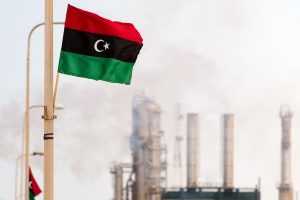
In competing for lucrative reconstruction contracts, China, Italy, France, Russia, and others are preventing the conflict from ending.
Four months after Libyan National Army (LNA) chieftain Khalifa Haftar began his assault on Tripoli, Libya is closer than ever to collapse. Haftar’s hopes for a swift seizure of the Libyan capital have unraveled due to stiff resistance from forces loyal to the United Nations-recognized Government of National Accord (GNA). Meanwhile, a panoply of international stakeholders—including China, Russia, Italy, France, and the Persian Gulf states—have become involved in the conflict, dragging it on. Although some of these actors cite the need to slow the flow of migrants from Libya to Europe or the hope of stabilizing Libya as rationales for foreign intervention, they’re also motivated by the prospect of lucrative reconstruction contracts.
The most bitterly contested contracts are in Libya’s oil industry, which is expected to double its production by 2023, and in infrastructure projects that leverage Libya’s strategic location on the Mediterranean Sea. For example, foreign powers are clamoring for dominance over the El Sharara and El Feel oil fields, which lie in southern Libya’s oil crescent; control of offshore oil deposits held by the GNA; and access to crucial ports, such as Benghazi and Ras Lanuf.
The balance of forces in Libya profoundly affects who will win what contracts. The United Arab Emirates, Saudi Arabia, Egypt, and France have supported the LNA’s military activities, and their economic interests hinge on the success of Haftar’s charge on Tripoli. Italy, Turkey, and Qatar have consistently supported the GNA and helped the U.N.-backed government resist Haftar’s territorial offensives. Russia and China have treaded cautiously in Libya and bet on neither party gaining a decisive advantage.
If the status quo, where the GNA controls Tripoli and its environs and the LNA dominates eastern and southern Libya, is formalized, Russia and China are poised to benefit the most.
If the status quo, where the GNA controls Tripoli and its environs and the LNA dominates eastern and southern Libya, is formalized, Russia and China are poised to benefit the most.
That is why they have advocated for maintaining this setup against other actors that would rather see the LNA or GNA emerge as the overwhelmingly dominant force.
And so, although Russia has been criticized for blocking a U.N. resolution condemning Haftar’s offensive on Tripoli and for allegedly deploying private military contractors in support of the LNA’s military activities, it has also maintained active relations with the GNA. This balancing strategy has economic foundations. Russia has printed dinars for distribution by Haftar’s parallel Libyan central bank, while the Russian energy giant Rosneft signed a deal to purchase oil from Libya’s National Oil Corporation in 2016.
Given these economic interests, the optimal scenario for Moscow is a peace settlement that ends the U.N.-enforced arms embargo against Libya and creates a frozen conflict. Prior to the overthrow of Libyan leader Muammar al-Qaddafi in 2011, Russia had $4 billion in arms contracts with Libya. Even today, the LNA’s air force relies extensively on Russian military technology, so Moscow would benefit greatly from the removal of the arms embargo.
Russia’s ability to balance favorable relations with the GNA and Haftar could also help Moscow land some much-coveted national infrastructure contracts. Russian companies are especially interested in constructing a railway linking Benghazi to Sirte, which would bolster Russia’s economic and geopolitical influence on the Mediterranean Sea, and Moscow hopes that its unique diplomatic strategy will help its bid for the $2.5 billion project triumph over rival offers.
As for China, which has adhered to a policy of stringent nonalignment in Libya, the preservation of the status quo could also help Beijing secure major reconstruction contracts. In recent years, China has taken steps to entrench itself as a major force in Libya’s oil industry and construction sector—both that controlled by the LNA and that controlled by the GNA.
After years of stagnation, Libya’s oil exports to China doubled in 2017, and National Oil Corporation Chairman Mustafa Sanallah has emphasized the importance of energy sector cooperation with Beijing. Libyan Prime Minister Fayez al-Sarraj has also pledged to expand the presence of Chinese companies in GNA-controlled territories, to guarantee Libya’s participation in China’s Belt and Road Initiative. North Africa is a small but rapidly growing area of interest for Chinese investors, and Beijing views a foothold in Libya as an essential component of its regional economic power projection strategy.
With Russia and China at a clear advantage, foreign powers that are unambiguously aligned with either the LNA or GNA are using military force to level the playing field.
With Russia and China at a clear advantage, foreign powers that are unambiguously aligned with either the LNA or GNA are using military force to level the playing field. Although Haftar’s goal of seizing Tripoli appears far-fetched, the LNA’s sponsors, including Egypt and France, hope that he gains enough territory for international institutions to legitimize his control over eastern and southern Libya. Meanwhile, the GNA’s primary allies, including Turkey and Italy, are seeking to stymie Haftar’s offensive and restore control over southern Libya’s oil reserves to the internationally recognized government. The failure of either faction to gain a decisive advantage has stalled the resolution of the conflict and exacerbated the France-Italy, Egypt-Turkey, and intra-Gulf struggles for dominance in Libya.
Since Haftar seized control of Benghazi in 2017, France and Italy have been locked in a competition for influence over Libya’s petroleum reserves. Initially, Italy had the upper hand, as the Italian firm Eni had extensive access to oil reserves in southern Libya. Italy’s ambassador to Libya at the time, Giuseppe Perrone, struck a deal with the GNA to rebuild Tripoli International Airport’s passenger terminal. Haftar’s seizure of southern Libya’s oil fields nullified Italy’s advantageous position, and the French oil giant Total is now the largest prospective beneficiary from these reserves. Recent clashes in Murzuq are a flash point in the France-Italy rivalry, as both countries view the fate of that town as potentially critical to the future power balance in southern Libya.
المركز المغاربي للأبحاث حول ليبيا
تعريف:
تأسس المركز المغاربي للأبحاث حول ليبيا في جوان - يونيو 2015 في تونس، وهو أول مركز من نوعه يعمل بكل استقلالية من أجل تعميق المعرفة بليبيا في جميع المجالات والقطاعات، ويرفد بالمادة العلمية جهود المجتمع المدني في ليبيا لإقامة الحكم الرشيد، المبني على التعددية والتداول السلمي واحترام حقوق الإنسان . مؤسس المركز: الإعلامي والباحث التونسي رشيد خشانة يقوم المركز بنشر مقالات وأوراق بحثية بالعربية والأنكليزية والفرنسية، ويُقيم مؤتمرات وندوات علمية، وباكورة نشاطاته ندوة حول "إسهام المجتمع المدني في إعادة الاستقرار والانتقال الديمقراطي بليبيا" يومي 5 و6 أكتوبر 2015 بتونس العاصمة.
موقع "ليبيا الجديدة"
موقع إخباري وتحليلي يبث الأخبار السريعة والتقارير السياسية والاقتصادية والثقافية والاجتماعية عن ليبيا، ديدنُه حق المواطن في الإعلام، ورائدُه التحري والدقة، وضالتُه الحقيقة، وأفقهُ المغرب العربي الكبير. يتبنى الموقع أهداف ثورة 17 فبراير ومبادئها السامية ويسعى للمساهمة في بناء ليبيا الجديدة القائمة على الديمقراطية واحترام حقوق الانسان والحكم الرشيد.

